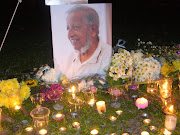The International Bar Association’s Human Rights Institute (IBAHRI) would like to correct some inaccurate comments made in the opinion piece 'Singapore has an Independent Judiciary' (Wall Street Journal, 23 July 2008) by Ms S. Radha, Press Secretary to the Minister for Law, Singapore. The opinion piece was made in response to the Wall Street Journal's editorial 'Judging Singapore's Judiciary' (15 July 2008). (Jacob: I've posted these below)
Ms Radha asserts that the IBAHRI’s report, Prosperity versus individual rights: Human rights, democracy and the rule of law in Singapore, contains "baseless" and 'vague' allegations about lack of impartiality and independence in the court’s consideration of defamation suits; and "errors of fact" about Supreme Court judges. However, as readers may see for themselves by accessing the report on our website, the observations made are based on comprehensive examples and evidence, and the 'errors of fact' she quotes are in fact misstatements of what the report actually says.
The IBAHRI’s concern about defamation suits initiated by People’s Action Party (PAP) litigants is evidenced by detailed case studies, court reports and a list of the awarded damages made in such defamation cases (see page 60 of the report). This list indicates that damages awarded by the court to successful PAP litigants are many times the amount awarded in non-PAP litigant cases. Contrary to Ms Radha’s article, these actions have not all been initiated in response to ‘scurrilous allegations of corruption’, but have often been in response to relatively minor comments or claims made by opposition members or candidates, or respected international publications.
Ms Radha tries to deflect criticism from our recommendation that Singapore should ‘put an end to the transfer of judges between executive and judicial roles’ by stating that ‘there is no need…because Supreme Court judges cannot be transferred and there has never been such a transfer.’ The concern voiced in the report, however, (on page 52) was not about Supreme Court judges, but that ‘Magistrates and district judges…are rotated to various positions within the Legal Service…which appears to be…a breach of the separation of powers doctrine’. The report does not claim that Supreme Court judges are transferred in this way, and its main point on this important aspect of establishing the independence of the judiciary thus remains unaddressed.
Ms Radha also states that the report denies that Supreme Court judges enjoy security of tenure until the age of 65. This is incorrect. On page 55, the report states that they do. However, the report expresses concern about those Supreme Court judges who remain in their positions after the age of 65, and are from then on in their positions at the will of the Prime Minister. The report notes the IBAHRI’s concerns about the lack of tenure for all other judges, including High Court judges.
Singapore Has an Independent Judiciary
July 23, 2008
Your editorial "Judging Singapore's Judiciary" (July 15) perpetuates the baseless allegations and errors of fact in the Report of the International Bar Association's Human Rights Institute.
The IBA Human Rights Institute's criticism of Singapore's judiciary is contradicted by the International Bar Association itself. Last year, IBA President Fernando Pombo said publicly that Singapore "has an outstanding legal profession, an outstanding judiciary, an outstanding academical world in relation to the law." You have suppressed this, and instead attributed the IBA Human Rights Institute's criticisms to the IBA, when the IBA President had stated the very opposite!
You also repeat the vague allegations in the Institute's Report that defamation suits involving the ruling party lack "impartiality and/or independence." The decisions of the Courts in these cases are matters of public record, and anyone questioning the verdicts can analyze and examine the decisions properly. Yet the Report contains nothing to back these claims.
Singapore ministers and government officials are held to the highest standards of probity and integrity. This has been recognized by international agencies like the Property and Environment Research Center and Transparency International. That is why investors put in billions of dollars into Singapore, and why Singapore is an oasis of prosperity and stability in Southeast Asia with one of the highest per-capita incomes in the world. Thus when scurrilous allegations of corruption are made, ministers and officials defamed will sue to clear their name. We see no virtue in becoming a society where anyone can freely publish untruths without having to back them up in court.
Further, contrary to the Report, all Supreme Court judges in Singapore enjoy "security of tenure" until retirement at 65. There is also no need to "put an end to the transfer of judges between executive and judicial roles" because Supreme Court judges cannot be transferred and there has never been such a transfer.
Western newspapers, NGOs and human rights groups like the IBA's Human Rights Institute prescribe Western norms as the way for other countries to "join the ranks of modern democracies." But not every Western norm is suitable to all countries in the world. Singapore cannot allow those who carry no responsibility for Singapore's future to dictate its political and legal systems. Singaporeans know that they have a noncorrupt government and an independent judiciary. They live in one of the top five most transparent countries in the world, with the freedom to express their views, oppose the government and take part in free and fair elections. Singaporeans will choose for themselves the shape and norms for their society.
S. Radha
Press Secretary to the Minister for Law
Singapore
Judging Singapore's Judiciary
FROM TODAY'S WALL STREET JOURNAL ASIA
July 15, 2008
Lee Kuan Yew recently noted the International Bar Association's decision to "honor" Singapore by holding its annual conference there last year. We hope the former Prime Minister, now Minister Mentor, takes equal note of the IBA's latest assessment of the judiciary in Singapore.
The IBA's human-rights institute issued a report last week on "human rights, democracy and the rule of law" in the city-state. Like numerous past observers, the IBA finds that Singapore limits political speech and assembly and exercises strict controls on the media.
The 72-page report also describes "concerns about the objective and subjective independence and impartiality" of the judiciary. In cases involving litigants from the ruling People's Action Party or PAP interests, the IBA finds "concerns about an actual or apparent lack of impartiality and/or independence, which casts doubt on the decisions made in such cases."
The IBA report is a good primer on Singapore's use of defamation cases against opposition politicians and the foreign press. It summarizes high-profile cases over the past 25 years against J. B. Jeyaretnam, Tang Liang Hong and Chee Soon Juan. And it reviews defamation cases against foreign publications, including this newspaper and our sister publication, the Far Eastern Economic Review, which currently is fighting defamation charges brought by Mr. Lee and his son, Prime Minister Lee Hsien Loong.
In a statement last week in response to the IBA report, the Law Ministry defended Singapore's legal system. "The cases brought by PAP members usually relate to scurrilous and completely untrue allegations of corruption made against them," it said. And, "It is also absurd to suggest that honorable and upright judges in commercial cases become compliant and dishonorable when dealing with defamation cases involving government ministers."
The IBA report concludes with 18 recommendations, including abolishing defamation as a criminal offense and urging government officials to "stop initiating defamation claims for criticisms made in the course of political debate." It also calls for "security of tenure" for all judges and an end to the transfer of judges between executive and judicial roles.
Singapore is unlikely to reform its political or judicial system anytime soon. But when the country is ready to join the ranks of modern democracies, the IBA's recommendations provide a good checklist of how to do so.














No comments:
Post a Comment